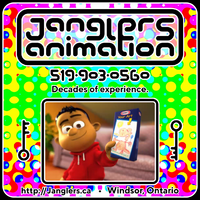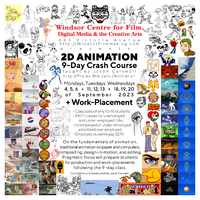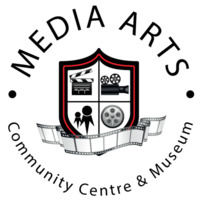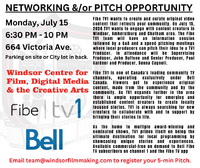Difference between revisions of "Key Jangling, television series pitch"
(Created page with "thumb|right|200px| '''[[Janglers Animation & Filmmaking''' in Windsor, Ontario.</br> View the "'''Promo 2024'''...") |
|||
| Line 10: | Line 10: | ||
A '''[https://en.wikipedia.org/wiki/Log_line logline]''' (aka elevator pitch) is a one or two line plot summary: | A '''[https://en.wikipedia.org/wiki/Log_line logline]''' (aka elevator pitch) is a one or two line plot summary: | ||
| − | The '''''Key Jangling''''' (working title) television series follows the production of an original short animated video by autistic adult student [[Jarrod Osborne]] under the developmental supervision and tutelage of professional animator [[Jason Carswell]], along with the pros and cons of filmmaking in [[Windsor, Ontario]] with community support. | + | The '''''Key Jangling''''' (working title) television series follows the workshop production of an original short animated video by autistic adult student [[Jarrod Osborne]] (and maybe others) under the developmental supervision and tutelage of professional animator [[Jason Carswell]], along with the pros and cons of filmmaking in [[Windsor, Ontario]] with community support. |
== Title == | == Title == | ||
| Line 42: | Line 42: | ||
Here is a loose proposed episode rundown and format that, not necessarily in this order, among other things, may include: | Here is a loose proposed episode rundown and format that, not necessarily in this order, among other things, may include: | ||
| − | # opening hook, dramatic clip or | + | # opening hook, dramatic clip or outstanding concept from within |
# short animated credits (by animator [[Jason Carswell]]) | # short animated credits (by animator [[Jason Carswell]]) | ||
| − | # | + | # quick summary (or episode 1 introductions and brief background stories) |
| − | # | + | # episodic themes may focus on filmmaking or animation fundamental principles that may include: |
| − | # | + | ## conceptualization |
| − | # | + | ##* seed ideas, goals, outline, script, staging, storyboards, composition & cinematography |
| − | # | + | ## production design |
| − | # | + | ##* character design, layout, limitations & stylizations |
| − | # | + | ## basics & planning |
| − | # | + | ##* thumbnails & breakdowns, physics & timing, squash & stretch, arcs & easing |
| − | # | + | ## keys |
| − | # | + | ##* clarity, silhouettes, acting & pantomime, reference material |
| − | # | + | ## dynamic flow |
| − | # | + | ##* thumbnails (again), primary & secondary action, successive breaking joints |
| − | # | + | ## contrast |
| − | # | + | ##* squash & stretch (again), lines of action & reversals, opposing action, counter pose |
| + | ## dynamic flow contrast | ||
| + | ##* anticipation + overshoot + settle, overlap & follow through | ||
| + | ## acting contrast | ||
| + | ##* anticipation + overshoot + settle (again), accents, exaggeration | ||
| + | ## technology usage (paper, tablet, applications, etc.) | ||
| + | ## capturing & compositing | ||
| + | ## editing & post production & rendering | ||
| + | ## promotion & income | ||
| + | ## final results | ||
| + | # challenges and issues faced in each episode | ||
| + | # explanatory mini-documentaries for context (maybe use clips, interviews, etc., perhaps with permission) | ||
| + | # solutions and trade-offs for each episode | ||
| + | # "what we learned" | ||
# motivational conclusion (ie. heartwarming scene, quote, rant, etc.) | # motivational conclusion (ie. heartwarming scene, quote, rant, etc.) | ||
# closing animated credits | # closing animated credits | ||
Revision as of 17:35, 14 July 2024

View the "Promo 2024" demo reel video on YouTube or PeerTube.
Jason Carswell worked on all included shots, alone or with a small team in an animation studio.

A logline (aka elevator pitch) is a one or two line plot summary:
The Key Jangling (working title) television series follows the workshop production of an original short animated video by autistic adult student Jarrod Osborne (and maybe others) under the developmental supervision and tutelage of professional animator Jason Carswell, along with the pros and cons of filmmaking in Windsor, Ontario with community support.
Title
The name "Key Jangling" holds several layers of meaning. This name may change as this documentary project takes shape.
- Keys or key-frames are a fundamental part of animation production.
- Showrunner and featured animation teacher, Jason Carswell, is starting up a Windsor-based animation company, Janglers Animation.
- Janglers Animation & Filmmaking, Windsor, Ontario
- http://Janglers.ca
- Jason Carswell
- Jason@Projex.Wiki
- 519.903.0560
- Janglers Animation & Filmmaking, Windsor, Ontario
- " A key jangler or key jangling refers to anything that attempts to entertain the audience with the same (for example) jokes, one-liners, pranks, skits, (etc.) or anything similar which expects the audience to burst into laughter. Key jangling goes back to how a parent would jangle their keys in front of their baby to make them laugh or to distract them, which often works however, eventually becomes stale and unfunny over time as the baby would simply get tired and annoyed of the same material. " ~ Urban Dictionary
- Among over 27 definitions on Wiktionary, here are a few:
- An object designed to open and close a lock.
- An object designed to fit between two other objects in a mechanism and maintain their relative orientation.
- A crucial step or requirement.
- A guide to the correct answers of a worksheet or test.
- (computing) One of several small, usually square buttons on a typewriter or computer keyboard, mostly corresponding to text characters.
- (music) A scale or group of pitches constituting the basis of a musical composition.
- (figurative) The general pitch or tone of a sentence or utterance.
- (advertising) A modification of an advertisement so as to target a particular group or demographic.
- (cryptography) A piece of information (e.g., a password or passphrase) used to encode or decode a message or messages.
- (Internet) A password restricting access to an IRC channel.
- (print and film) The black ink layer, especially in relation to the three color layers of cyan, magenta, and yellow (CMYK).
- (computer graphics, television) A color to be masked or made transparent.
Episode rundown
Here is a loose proposed episode rundown and format that, not necessarily in this order, among other things, may include:
- opening hook, dramatic clip or outstanding concept from within
- short animated credits (by animator Jason Carswell)
- quick summary (or episode 1 introductions and brief background stories)
- episodic themes may focus on filmmaking or animation fundamental principles that may include:
- conceptualization
- seed ideas, goals, outline, script, staging, storyboards, composition & cinematography
- production design
- character design, layout, limitations & stylizations
- basics & planning
- thumbnails & breakdowns, physics & timing, squash & stretch, arcs & easing
- keys
- clarity, silhouettes, acting & pantomime, reference material
- dynamic flow
- thumbnails (again), primary & secondary action, successive breaking joints
- contrast
- squash & stretch (again), lines of action & reversals, opposing action, counter pose
- dynamic flow contrast
- anticipation + overshoot + settle, overlap & follow through
- acting contrast
- anticipation + overshoot + settle (again), accents, exaggeration
- technology usage (paper, tablet, applications, etc.)
- capturing & compositing
- editing & post production & rendering
- promotion & income
- final results
- conceptualization
- challenges and issues faced in each episode
- explanatory mini-documentaries for context (maybe use clips, interviews, etc., perhaps with permission)
- solutions and trade-offs for each episode
- "what we learned"
- motivational conclusion (ie. heartwarming scene, quote, rant, etc.)
- closing animated credits
- sponsors, if applicable
- Easter egg ending
Series production
First timer
These initial concepts will be revised and evolve. Despite the lack of series production experience, with robust professional experience in animation, live-action art direction, and event production, a first effort presented here begins the organizing, development, and production process.
Format and reasons
Below, under the schedule section, is ongoing legislation and regulation, the unceasing vehicles of government overreach, the very antagonist origins that inspires this television series pitch. This is at the top of the list of anything external to potentially initiate changes to production plans, so we should always keep this in mind, flexibly prepared for detours with backup strategies.
Also listed below are over two dozen critical themes, with the endless potential of countless other problematic issues in need of mass awareness. Further, there's no end to the combinations, intermixing, and overlapping of those topics affecting humanity. (Akin to how musical genres can overlap in unexpected fusions.) A lack of content is not a problem - focus is.
A large group of people + a large number of topics = flexibility to focus on specific folks in some episodes, or bounce between many. Some folks may have opinions on everything, stick to their fields of expertise, or range between.
Transparency
Showrunner, Jason Carswell, is an intensely passionate advocate for FOEPATCHISM inclusive ethical social and project management. (Fair, Open, Ethical, Peaceful, Accountable, Transparent, Consistent, Honest, Inclusive, Social, Management) This includes actively promoting the open-source movement, crowd-sourcing, decentralizing all things, copyleft activism, self-reliance, sustainability, agorism, voluntaryism, etc. Therefore, it would be hypocritical to not try to develop this series openly and inclusively*, on Projex.Wiki and/or via other communications. This would include budgets, planning, schedules, and of course the final product. Open book policy.
* Inclusively means anyone is not just passively allowed but encouraged to join and openly participate constructively (rather than the woke meaning). Aside from negative activity (which may require clear definitions) we won't discriminate for any reasons, though we may be forced to use closed/private communications.
Ideally, after the series has met its contractual obligations with TV1, the episodes, raw video utilized, and additional unused recordings might be shared copyright-free, made freely available for sharing, researching, archiving, and for anyone (ie. Windsor Media Center and Internet students) to edit with as they see fit. Hopefully folks might be inspired to create fan edits, documentaries, feature films, or crowd-source similar supplemental content from beyond Windsor and Essex County for broader contextual understanding of these critical issues.
Schedule
An accurate, reasonable budget and schedule will require consulting with experienced professionals. Nonetheless, this is just a foundational catalyst for discussion and development. These initial guesstimates may be general averages, understanding learning curve and startup pace should improve, and some episodes may be easier than others - unless ambitions and complexities grow with experience. Naturally, as in animation studios that produce television commercials, one project is starting, another is underway, and one is wrapping up - so I'd expect episode overlapping. Especially if some stories and circumstances develop across months.
Some episodes will take much longer than a week and some much less, but this is a start to work from.
- 8x pre-production
- 8x shooting
- 8x rough edit
- 8x tweaked edit
- 8x post-production
- 8x finalizing
- = 48 "weeks"
- plus : animated intro, branding, and graphic design
- = 48 "weeks"
8 episodes x 20-25 minutes + 1 year seems plausible to result in 160 to 200 minutes of documentary journalism, with an abundance of potential for many more seasons/years.
Ongoing legislation and regulation
Regardless of the number of episodes or the season's length, a common documentary filmmaker's issue is a question of when to conclude documenting and investigating. Because this proposal is a glimpse into Windsor and Essex County culture, it's not about a singular issue. That doesn't mean we shouldn't plan around topical episodes or have deadlines. Whether a Canadian bill has passed or is yet to pass won't much change opinions or insights about it. More importantly, keeping tabs on what bills are coming up or were recently passed can be an integral focus and critical aspect to consider for scheduling and interviewing - and follow up re-interviewing.
Resources
Jason Carswell can confidently wear many hats (producer, creative director, screenwriter, production manager, storyboarder, editor, animation director, animation supervisor, animator, graphic designer, art director, etc.), alone, but would prefer to lead a small tight capable team, recognizing limitations and inexperience as live-action director, camera operator, sound recorder, sound engineer, interviewer, performance, vanities, music composer, etc.
Resources to verify:
- ☐ TV1 budget covers art department expenses (costuming, props, sets, etc.) - inapplicable to this pitch
- ☐ TV1 lends all camera, lighting, audio gear, and backup media
- ☐ TV1 budget covers cast (actors) - inapplicable to this pitch
- ☐ TV1 budget covers crew (camera men, sound, vanities, etc)
- ☐ TV1 budget covers post-production workstations (editing, animation, backup media, etc)
- ☐ TV1 budget covers editors, music, sound engineering, post-production
- ☐ TV1 budget covers promotional website?, design?, social media?
Resources to request:
- ☐ compensation sufficient for professional filmmaker and showrunner Jason Carswell
- ☐ for development and pre-production (treatments, screenwriting, production management, producing, etc.)
- ☐ for production, producing, and creative direction
- ☐ for post-production (editing, animation, promotion, social media, etc.)
The only critically urgent demands are for immediate production expenses, a pittance to live on, and transportation - however we must also prepare for a few wild cards that may come up. Government overreach is a massive problem, and productions like this may face censorship, sabotage, or worse. Unprecedented medical tyranny, unscientific lockdowns, and intentional economic collapse loom over every endeavour on Earth. Leviathan corporations like Bell Media are problematically participants of the corporatocracy. Contrastingly, Bell Media might offer refuge from potential problems. No matter how eager to be flexible for this opportunity, eroded trust remains hard won in this climate - so as much as offering delayed gratification might have once been a viable negotiation tool, the world has changed too much. Unlike a capitalist studio with tight budgets, I doubt government-funded Bell Media would care too much about such tactics anyway. Regardless, a good production is ultimately what really matters.
Budget
An accurate, reasonable budget and schedule will require consulting with experienced professionals.
Full disclosure
This page and these projects may seem overly obvious, self explanatory, excessively linked, etc. Not only are these pages for TV1 producers, but they're illustrative of projects that anyone may create on Projex.Wiki, and might develop into suitable teaching tools for the Windsor Media Center and beyond.
See also
- Animation
- Bell Media
- Fibe
- Filmmaking
- Independent media
- Key Jangling, television series pitch
- Media alternatives
- Media ideas
- Media projects
- Original content
- Pitches
- Production development
- Projects started in 2024
- Television
- Television series pitches
- TV1
- Windsor animation
- Windsor communications
- Windsor dramatic productions
- Windsor documentary productions
- Windsor entertainment
- Windsor filmmaking
- Windsor indie-media
- Windsor media
- Windsor video productions
- Windsor videos


